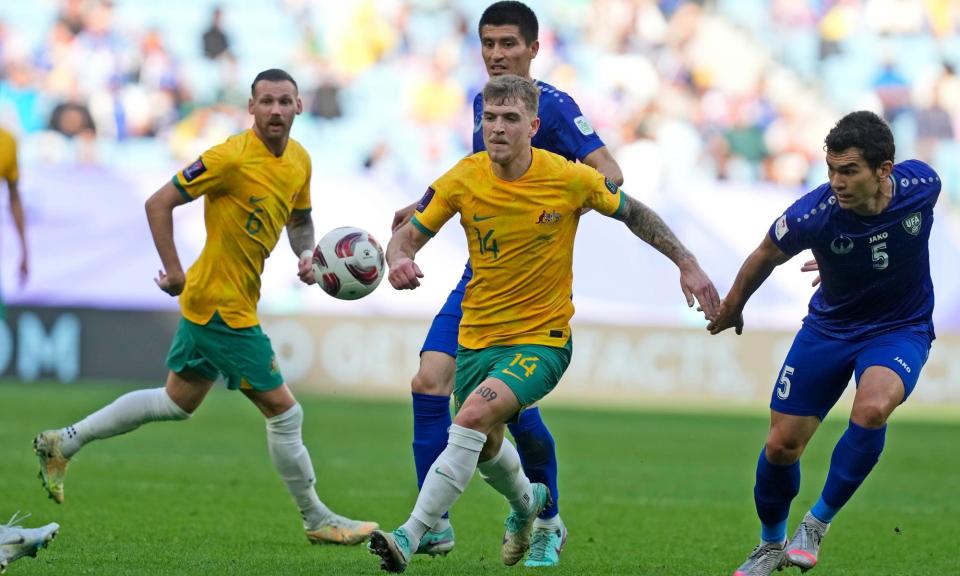Socceroos hold on to hopes of deep Asian Cup run despite familiar concerns

There is a sense of déjà vu about where Australia are at right now and, perhaps more pressingly, where they might be heading after reaching the knockout stages at the Asian Cup in Qatar.
On a base level, the most important step is that two wins and a draw have ensured the Socceroos’ progression to the round of 16 as group B winners, where they will meet Indonesia. It is a contest they will be expected to win and maintain their record of reaching at least the quarter-finals of every Asian Cup they have competed in.
Related: Australia pegged back by Uzbekistan but finish top of Asian Cup group
But there are also echoes of history in the way that this side has approached their opening month in Doha, in terms of the style of football played, the messaging coming out of the camp and perhaps even how that is being absorbed back home. It has not necessarily been the throwback to the 2022 World Cup that they may have been hoping for.
In the aftermath of the Socceroos’ 1-1 draw with Uzbekistan, coach Graham Arnold appeared perturbed at the criticism that has been directed at his team over their inability to convert possessional dominance in their opening three games into fluidity and incisiveness in attack. Arnold pointed to the challenges associated with bringing together a disparate group of players at short notice and getting them to function as a collective, how the team was built off the back of a strong defensive foundation and how it was individuals who weren’t hitting “the last pass, the last cutback or finish” that was dragging the team down.
None of these points are wrong, it needs noting, because a press conference with Arnold is never just a press conference. As much as the fourth estate irks him, he is well-practised in the art of putting forward a message or a catchphrase, a perspective, or even a reality of his choosing to suit his needs. There are signs of the defiant, siege mentality in which Arnold and his teams thrive, and while he will inevitably know that improvements are needed, it’s far better for him that those public critiques come from others as the group internally rallies around each other. Observe the Socceroos’ heavy defeat to France at the 2022 World Cup and what came next.
But placed in the broader context, it’s not the whole picture either. Australia’s issue with penetrating low defensive blocks has been prevalent throughout Arnold’s tenure since 2018. The concerns almost cost the coach his job during qualifying for the last World Cup when blunt draws against China and Oman – fixtures in which frequent declarations from some corners that the Socceroos didn’t have the “cattle” to compete, didn’t carry weight – set them on a path to an intercontinental playoff.
The 12 months that followed served to quiet much of the criticism. It’s difficult to call for the job of someone who just guided Australia to its best-ever men’s World Cup performance, after all, and that’s an accomplishment that cannot be taken away from him. But there was always the possibility the struggle would re-emerge during this cycle, once the backs-against-the-wall, us-against-the-world circumstances of the World Cup passed and Asian football’s grind returned.
Arnold has been coaching since 1998. His methods have inevitably evolved, but the foundation underpinning it all has seen him become one of the most successful coaches in Australian history, as well as a mentor highly regarded overseas. Football Australia knew all about the highs of his approach but also the lows – lows that saw the federation itself undermine Arnold after the Japan defeat – when they moved to give him a new deal very quickly and with little review after the World Cup. Asking him to change now, or getting angry with him for being who he is, is missing the point. It wasn’t he who decided to make his vision the Socceroos’ north star.
Thus, maybe this is just how it’s going to be. Over the next four years, if this Asian Cup group stage is any guide, we’ll all lose our minds as the Socceroos put minnows like Bangladesh to the sword and make their way through the continent’s footballing middle class in a manner that gets results but probably isn’t pretty. In games against the continent’s best, as well as the World Cup proper, where they can play a more reactive role, Arnold’s strengths will likely come to the fore. There will probably be requests for more, and those asks won’t be unreasonable.
Related: John Aloisi’s 2005 penalty is unforgettable – but our commentary still makes me cringe | Simon Hill
That goes for the coming weeks in Doha as well. A quarter-final exit against Saudi Arabia wouldn’t surprise but at the same time it’s also not out of the bounds of possibility that with several other heavyweights dealing with their own issues, the Socceroos can improve things enough to stage a deep run through the knockouts. Ultimately, that’s what we want. Even if, football being football, there exist different interpretations of how to get there.
Follow updates with our live blog as Australia face Indonesia in their Asian Cup round of 16 match on 28 January, kick-off is 10.30pm AEDT

